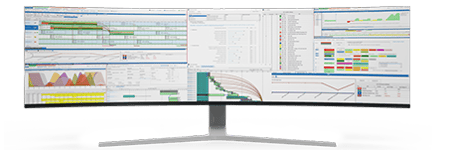Big Data in Procurement: Transforming Decision-Making
Leveraging big data is no longer a luxury but a necessity for organizations seeking to streamline procurement processes, reduce costs, and maintain a competitive edge. For Purchasing Managers in packaging manufacturing, big data offers immense potential to transform procurement decision-making, providing insights that drive smarter buying, enhance supplier relationships, and enable more resilient supply chains.
As part of this transformation, the integration of advanced planning and scheduling tools like PlanetTogether with ERP systems such as SAP, Oracle, Microsoft Dynamics, Kinaxis, or Aveva, enables organizations to harness the full power of big data in procurement. By combining production planning and scheduling with real-time procurement insights, Purchasing Managers can navigate complex supply networks with a high degree of accuracy and responsiveness.
Here’s a look into how big data can redefine procurement in packaging manufacturing and how integrated systems can support this shift.

The Role of Big Data in Modern Procurement
Big data in procurement entails the collection, analysis, and application of vast amounts of data generated from suppliers, market trends, inventory levels, order histories, production schedules, and logistics. In packaging manufacturing, where demand fluctuations and material costs are key challenges, big data offers Purchasing Managers tools to make decisions rooted in predictive insights rather than reactive actions.

Key Benefits of Big Data in Procurement
Enhanced Demand Forecasting
Accurate demand forecasting is crucial for managing inventory levels, reducing stockouts, and minimizing overstocking. Big data allows Purchasing Managers to analyze historical data and incorporate external factors like seasonal trends, customer demand shifts, and economic indicators. With data-backed forecasts, managers can adjust procurement plans to align with production needs, reducing waste and optimizing resources.
Supplier Risk Management
Managing supplier relationships effectively is essential to ensuring consistent supply chain performance. Big data enables real-time tracking of supplier performance across parameters such as delivery timelines, quality control, and price fluctuations. By identifying at-risk suppliers early, Purchasing Managers can proactively develop contingency plans, reducing disruptions to production.
Cost Optimization
One of the primary goals in procurement is to reduce costs while maintaining quality. Big data provides insights into pricing trends, alternative sourcing options, and volume-based discounts. By analyzing historical spend data and market conditions, Purchasing Managers can negotiate more effectively with suppliers, achieving better rates and contract terms.
Sustainability and Compliance
As sustainability becomes a greater focus, big data helps organizations track sourcing practices, waste management, and compliance with environmental regulations. Packaging manufacturing, in particular, faces growing pressure to adopt sustainable sourcing, and big data helps managers make decisions that align with these goals, enhancing brand reputation and compliance adherence.
![]()

Integrating PlanetTogether with ERP Systems: Unlocking Procurement Insights
The power of big data in procurement is amplified when integrated with advanced planning systems like PlanetTogether and ERP solutions such as SAP, Oracle, Microsoft Dynamics, Kinaxis, or Aveva. This integration provides a seamless flow of information between production scheduling and procurement, helping Purchasing Managers make better, faster decisions based on real-time data.
How Integration Enhances Big Data Applications in Procurement
Real-Time Visibility Across Functions
Integration enables real-time data flow between procurement and production planning, creating a single source of truth for Purchasing Managers. For instance, a spike in demand detected by PlanetTogether can instantly update the ERP system, triggering a procurement alert to adjust order quantities accordingly. This reduces the need for manual data entry and minimizes the risk of human error.
Optimized Inventory Management
By connecting PlanetTogether with ERP systems, Purchasing Managers gain visibility into current stock levels, production schedules, and future requirements. This allows for more accurate inventory planning and reduces the need for excess safety stock, saving both storage costs and working capital.
Supplier Performance Analysis
Integrated systems allow Purchasing Managers to track supplier performance in real time, utilizing data from production metrics to identify patterns such as frequent delays or quality issues. This data can then inform strategic decisions, such as diversifying supplier bases or implementing performance-based contracts.
Cost Reduction Through Predictive Analytics
When PlanetTogether's scheduling data integrates with an ERP system, purchasing teams can forecast material needs and negotiate bulk discounts based on predicted demand. Purchasing Managers can use these insights to lock in favorable pricing or identify the optimal time for ordering, reducing the impact of market volatility on material costs.

Practical Use Cases of Big Data and Integration in Procurement for Packaging Manufacturing
Let’s explore some practical scenarios where big data and integrated systems like PlanetTogether with SAP or Oracle enhance procurement in packaging manufacturing.
Demand Spike Management
Packaging companies often face fluctuating demand based on client industries, like food and beverage or consumer goods. During seasonal peaks, integrated systems help predict demand spikes and ensure suppliers have the capacity to meet increased orders. When PlanetTogether signals a rise in production due to an anticipated demand increase, the ERP system immediately informs procurement. Purchasing Managers can then initiate bulk orders, avoiding last-minute price surges or delays.
Supplier Selection and Qualification
For a Purchasing Manager, supplier reliability is paramount. With big data analytics, performance metrics for each supplier are tracked and analyzed over time. Integration with PlanetTogether allows for an even deeper understanding by linking supplier performance directly with production output metrics. This insight assists in qualifying suppliers based on quality, delivery performance, and cost-effectiveness, driving strategic supplier partnerships.
Managing Volatile Raw Material Costs
Material costs in packaging can vary significantly, impacting profitability. Integrated data from PlanetTogether and an ERP system like Oracle or Microsoft Dynamics provides Purchasing Managers with a predictive edge. By analyzing historical trends and predicting future demand, purchasing can secure raw materials at lower prices before market rates escalate, mitigating the risk of increased material costs.
Waste Reduction Through Better Inventory Control
Inventory mismanagement can result in material waste, especially for packaging materials with shorter shelf lives. With big data analytics, Purchasing Managers can track inventory turnover rates and expiry dates. Integrated planning and scheduling information from PlanetTogether allows managers to order materials in precise quantities, reducing wastage and aligning with sustainability initiatives.

Best Practices for Implementing Big Data and Integration in Procurement
For Purchasing Managers aiming to harness the power of big data in procurement, the integration of systems like PlanetTogether and SAP, Oracle, Microsoft, Kinaxis, or Aveva should be approached strategically. Here are some best practices to consider:
Define Clear Data Objectives
Determine the specific goals you want to achieve through big data, such as cost reduction, improved supplier performance, or enhanced demand forecasting. Having a clear objective guides the data collection and integration process, ensuring resources are used efficiently.
Invest in Data Quality and Cleanliness
The success of big data relies on high-quality data. Ensure that data from production, suppliers, and procurement processes is accurate, complete, and up-to-date. Implementing data validation processes in both PlanetTogether and ERP systems helps maintain data quality.
Enable Real-Time Data Access
Real-time access is crucial for effective decision-making. Integrate your systems to facilitate live data sharing between procurement and production, allowing Purchasing Managers to act on the latest information without delays.
Focus on User Training and Change Management
Transitioning to a big data-driven approach requires new skills and understanding of analytics tools. Providing training on data interpretation and system integration helps your team maximize the benefits of big data in procurement.
Monitor and Adjust Strategy Based on Insights
Big data is not a static asset; it requires ongoing analysis. Regularly review procurement data insights and adjust strategies accordingly. For instance, if data reveals underperforming suppliers, consider revisiting your sourcing strategy or initiating performance improvement discussions.
The impact of big data on procurement in packaging manufacturing is transformative. By enabling data-driven decision-making, big data helps Purchasing Managers optimize costs, mitigate supplier risks, and improve demand forecasting. Integrating systems like PlanetTogether with ERP solutions such as SAP, Oracle, Microsoft, Kinaxis, or Aveva further amplifies these benefits, creating a cohesive environment where procurement and production work in harmony.
As packaging manufacturers continue to face pressure for cost efficiency, sustainability, and resilience, embracing big data and system integration becomes indispensable. Purchasing Managers who leverage these tools will be well-positioned to drive their organizations toward sustainable growth and operational excellence.
Are you ready to take your manufacturing operations to the next level? Contact us today to learn more about how PlanetTogether can help you achieve your goals and drive success in your industry.
Topics: PlanetTogether Software, Integrating PlanetTogether, Enhanced Demand Forecasting, Optimized Inventory Management, Improved Cost Optimization, Sustainability and Compliance, Packaging Manufacturing, Supplier Risk Management, Real-Time Visibility Across Functions, Cost Reduction Through Predictive Analytics




















LEAVE A COMMENT